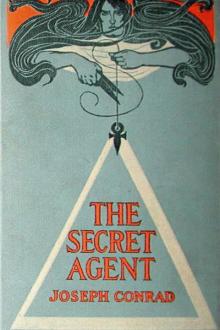The Secret Agent: A Simple Tale by Joseph Conrad (fantasy books to read TXT) 📗

- Author: Joseph Conrad
Book online «The Secret Agent: A Simple Tale by Joseph Conrad (fantasy books to read TXT) 📗». Author Joseph Conrad
Lost in the crowd, miserable and undersized, he meditated confidently on his power, keeping his hand in the left pocket of his trousers, grasping lightly the india-rubber ball, the supreme guarantee of his sinister freedom; but after a while he became disagreeably affected by the sight of the roadway thronged with vehicles and of the pavement crowded with men and women. He was in a long, straight street, peopled by a mere fraction of an immense multitude; but all round him, on and on, even to the limits of the horizon hidden by the enormous piles of bricks, he felt the mass of mankind mighty in its numbers. They swarmed numerous like locusts, industrious like ants, thoughtless like a natural force, pushing on blind and orderly and absorbed, impervious to sentiment, to logic, to terror too perhaps.
That was the form of doubt he feared most. Impervious to fear! Often while walking abroad, when he happened also to come out of himself, he had such moments of dreadful and sane mistrust of mankind. What if nothing could move them? Such moments come to all men whose ambition aims at a direct grasp upon humanity—to artists, politicians, thinkers, reformers, or saints. A despicable emotional state this, against which solitude fortifies a superior character; and with severe exultation the Professor thought of the refuge of his room, with its padlocked cupboard, lost in a wilderness of poor houses, the hermitage of the perfect anarchist. In order to reach sooner the point where he could take his omnibus, he turned brusquely out of the populous street into a narrow and dusky alley paved with flagstones. On one side the low brick houses had in their dusty windows the sightless, moribund look of incurable decay—empty shells awaiting demolition. From the other side life had not departed wholly as yet. Facing the only gas-lamp yawned the cavern of a second-hand furniture dealer, where, deep in the gloom of a sort of narrow avenue winding through a bizarre forest of wardrobes, with an undergrowth tangle of table legs, a tall pier-glass glimmered like a pool of water in a wood. An unhappy, homeless couch, accompanied by two unrelated chairs, stood in the open. The only human being making use of the alley besides the Professor, coming stalwart and erect from the opposite direction, checked his swinging pace suddenly.
“Hallo!” he said, and stood a little on one side watchfully.
The Professor had already stopped, with a ready half turn which brought his shoulders very near the other wall. His right hand fell lightly on the back of the outcast couch, the left remained purposefully plunged deep in the trousers pocket, and the roundness of the heavy rimmed spectacles imparted an owlish character to his moody, unperturbed face.
It was like a meeting in a side corridor of a mansion full of life. The stalwart man was buttoned up in a dark overcoat, and carried an umbrella. His hat, tilted back, uncovered a good deal of forehead, which appeared very white in the dusk. In the dark patches of the orbits the eyeballs glimmered piercingly. Long, drooping moustaches, the colour of ripe corn, framed with their points the square block of his shaved chin.
“I am not looking for you,” he said curtly.
The Professor did not stir an inch. The blended noises of the enormous town sank down to an inarticulate low murmur. Chief Inspector Heat of the Special Crimes Department changed his tone.
“Not in a hurry to get home?” he asked, with mocking simplicity.
The unwholesome-looking little moral agent of destruction exulted silently in the possession of personal prestige, keeping in check this man armed with the defensive mandate of a menaced society. More fortunate than Caligula, who wished that the Roman Senate had only one head for the better satisfaction of his cruel lust, he beheld in that one man all the forces he had set at defiance: the force of law, property, oppression, and injustice. He beheld all his enemies, and fearlessly confronted them all in a supreme satisfaction of his vanity. They stood perplexed before him as if before a dreadful portent. He gloated inwardly over the chance of this meeting affirming his superiority over all the multitude of mankind.
It was in reality a chance meeting. Chief Inspector Heat had had a disagreeably busy day since his department received the first telegram from Greenwich a little before eleven in the morning. First of all, the fact of the outrage being attempted less than a week after he had assured a high official that no outbreak of anarchist activity was to be apprehended was sufficiently annoying. If he ever thought himself safe in making a statement, it was then. He had made that statement with infinite satisfaction to himself, because it was clear that the high official desired greatly to hear that very thing. He had affirmed that nothing of the sort could even be thought of without the department being aware of it within twenty-four hours; and he had spoken thus in his consciousness of being the great expert of his department. He had gone even so far as to utter words which true wisdom would have kept back. But Chief Inspector Heat was not very wise—at least not truly so. True wisdom, which is not certain of anything in this world of contradictions, would have prevented him from attaining his present position. It would have alarmed his superiors, and done away with his chances of promotion. His promotion had been very rapid.
“There isn’t one of them, sir, that we couldn’t lay our hands on at any time of night and day. We know what each of them is doing hour by hour,” he had declared. And the high official had deigned to smile. This was so obviously the right thing to say for an officer of Chief Inspector Heat’s reputation that it was perfectly delightful. The high official believed the declaration, which chimed in with his idea of the fitness of things. His wisdom was of an official kind, or else he might have reflected upon a matter not of theory but of experience that in the close-woven stuff of relations between conspirator and police there occur unexpected solutions of continuity, sudden holes in space and time. A given anarchist may be watched inch by inch and minute by minute, but a moment always comes when somehow all sight and touch of him are lost for a few hours, during which something (generally an explosion) more or less deplorable does happen. But the high official, carried away by his sense of the fitness of things, had smiled, and now the recollection of that smile was very annoying to Chief Inspector Heat, principal expert in anarchist procedure.
This was not the only circumstance whose recollection depressed the usual serenity of the eminent specialist. There was another dating back only to that very morning. The thought that when called urgently to his Assistant Commissioner’s private room he had been unable to conceal his astonishment was distinctly vexing. His instinct of a successful man had taught him long ago that, as a general rule, a reputation is built on manner as much as on achievement. And he felt that his manner when confronted with the telegram had not been impressive. He had opened his eyes widely, and had exclaimed “Impossible!” exposing himself thereby to the unanswerable retort of a finger-tip laid forcibly on the telegram which the Assistant Commissioner, after reading it aloud, had flung on the desk. To be crushed, as it were, under the tip of a forefinger was an unpleasant experience. Very damaging, too! Furthermore, Chief Inspector Heat was conscious of not having mended matters by allowing himself to express a conviction.
“One thing I can tell you at once: none of our lot had anything to do with this.”
He was strong in his integrity of a good detective, but he saw now that an impenetrably attentive reserve towards this incident would have served his reputation better. On the other hand, he admitted to himself that it was difficult to preserve one’s reputation if rank outsiders were going to take a hand in the business. Outsiders are the bane of the police as of other professions. The tone of the Assistant Commissioner’s remarks had been sour enough to set one’s teeth on edge.
And since breakfast Chief Inspector Heat had not managed to get anything to eat.
Starting immediately to begin his investigation on the spot, he had swallowed a good deal of raw, unwholesome fog in the park. Then he had walked over to the hospital; and when the investigation in Greenwich was concluded at last he had lost his inclination for food. Not accustomed, as the doctors are, to examine closely the mangled remains of human beings, he had been shocked by the sight disclosed to his view when a waterproof sheet had been lifted off a table in a certain apartment of the hospital.
Another waterproof sheet was spread over that table in the manner of a table-cloth, with the corners turned up over a sort of mound—a heap of rags, scorched and bloodstained, half concealing what might have been an accumulation of raw material for a cannibal feast. It required considerable firmness of mind not to recoil before that sight. Chief Inspector Heat, an efficient officer of his department, stood his ground, but for a whole minute he did not advance. A local constable in uniform cast a sidelong glance, and said, with stolid simplicity:
“He’s all there. Every bit of him. It was a job.”
He had been the first man on the spot after the explosion. He mentioned the fact again. He had seen something like a heavy flash of lightning in the fog. At that time he was standing at the door of the King William Street Lodge talking to the keeper. The concussion made him tingle all over. He ran between the trees towards the Observatory. “As fast as my legs would carry me,” he repeated twice.
Chief Inspector Heat, bending forward over the table in a gingerly and horrified manner, let him run on. The hospital porter and another man turned down the corners of the cloth, and stepped aside. The Chief Inspector’s eyes searched the gruesome detail of that heap of mixed things, which seemed to have been collected in shambles and rag shops.
“You used a shovel,” he remarked, observing a sprinkling of small gravel, tiny brown bits of bark, and particles of splintered wood as fine as needles.
“Had to in one place,” said the stolid constable. “I sent a keeper to fetch a spade. When he heard me scraping the ground with it he leaned his forehead against a tree, and was as sick as a dog.”
The Chief Inspector,





Comments (0)